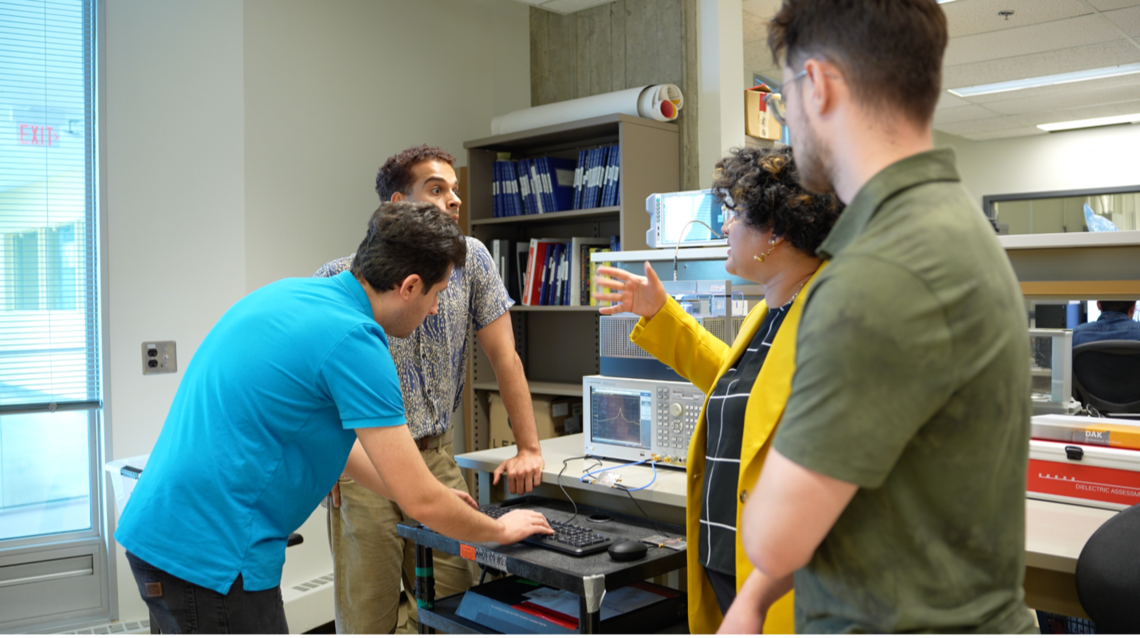Aug. 23, 2024
UCalgary-developed nutrient sensor device could transform agriculture industry

Farmers across Canada will soon have a new tool for real-time nutrient control and monitoring thanks to a team of University of Calgary researchers.
Dr. Zahra Abbasi, PhD, and her team at the Calgary Sensors Lab at the Schulich School of Engineering have partnered with Livestock Water Recycling (LWR) to create a cutting-edge nutrient-monitoring sensor device.
In the agriculture industry, regular nutrient monitoring in water is a necessary, yet tedious, process to assess nutrient levels. This involves collecting soil, drying out the soil to remove moisture, sieving the sample, sending it to the lab and then waiting for the results. Currently, there is no affordable approach to monitoring multiple nutrient levels at the same time in farms.
Abbasi and her researchers are working on eliminating these obstacles.
"It's a very labour-intensive process to take the sample to the lab, do very accurate measurements, and get the results, so a very critical, decision-making time can be missed," says Abbasi, an assistant professor with the Department of Electrical and Software Engineering and the principal investigator at the Calgary Sensor Lab.
The proposed device will seamlessly fit into existing agriculture setups, using electromagnetics, circuit and system development, and data analysis to instantly track nutrients like nitrogen, phosphorus and potassium.
A $1.7-million investment by LWR and Alberta Innovates’ Agri-Food and Bioindustrial Innovation Program supports the three-and-a-half-year project that began in April 2024.
The partnership with LWR aims to tackle agriculture’s challenges of overfertilization, underfertilization and nutrient contamination, in hopes of promoting a more sustainable food-production process.
The initiative aligns with Canada’s voluntary target to reduce fertilizer emissions by 30 per cent below 2020 levels by 2030. Additionally, it complements Fertilizer Canada's 4R Nutrient Stewardship program, Right Source @ Right Rate, Right Time, Right Place, addressing the issue of appropriate nutrient management. Addressing this technological gap is crucial for the sustainable future of agriculture and environmental conservation.
The team is working with LWR’s facilities, which provide affordable and effective solutions to help farmers create nutrient-sustainable farms. Abbasi connected with LWR in February 2022 during a Schulich Sparks event on precision agriculture, where they found a common interest in developing new hardware and facilities for nutrient management.
In the lab, Abbasi’s students learn highly technical skills related to radio frequency and microwave engineering. She says she hopes this knowledge will help them solve big challenges in the future such as food security and precision agriculture.

Zahra Abbasi and her students in the Calgary Sensors Lab.
Becca McInnes
“I’m really proud of my students and how they’re using complex radio frequency and microwave concepts to tackle real-world problems,” says Abbasi. “This project gives them a unique opportunity to apply their knowledge to important challenges in sustainable agriculture. I’m confident they’ll be the engineers solving critical issues now and in the future.”
Calgary Sensors Lab previously developed a tool for non-invasive glucose and hydration-level monitoring for humans and another for assessing the biomaterial surface of medical implants. The lab’s commitment to creating low-cost, user-friendly devices to perform real-time monitoring without being in direct contact with the sample they’re testing (thereby reducing the chance of contamination) has been demonstrated in multiple projects.
At the end of this project, Calgary Sensors Lab and LWR aim to integrate this prototype in the farm setting to test how convenient the monitoring is for Alberta’s agriculture industry.






